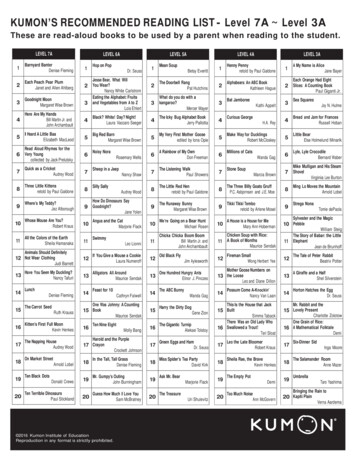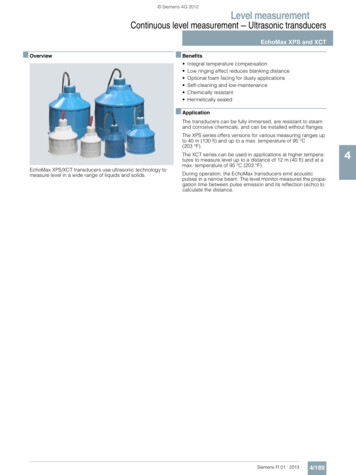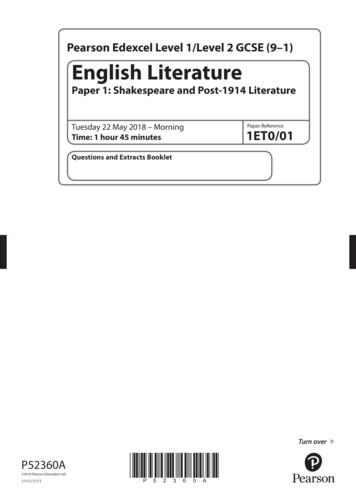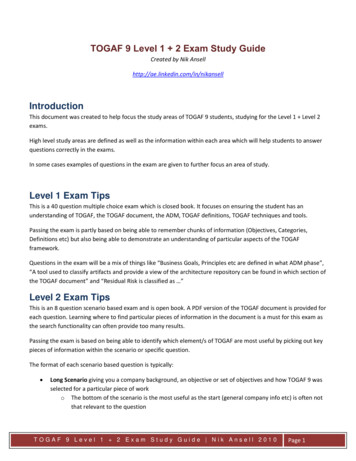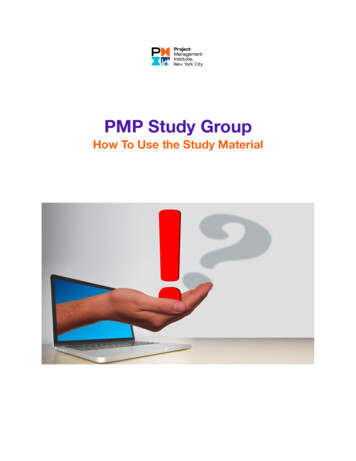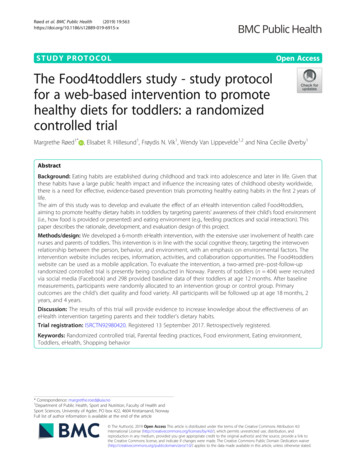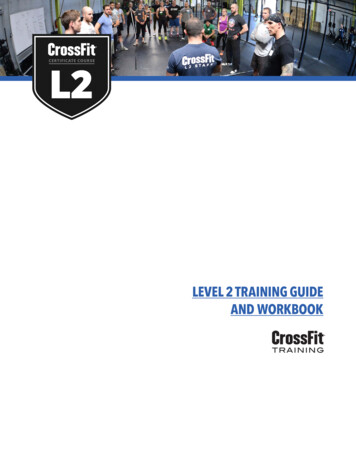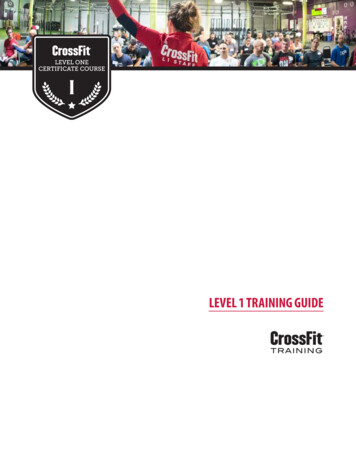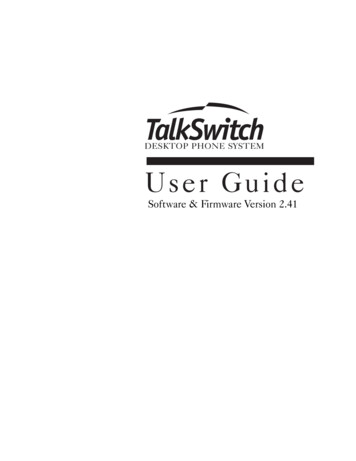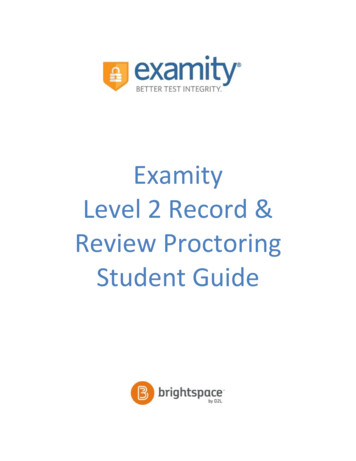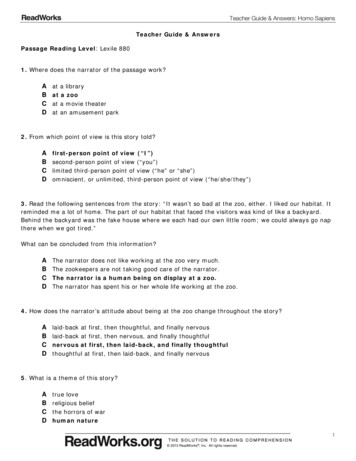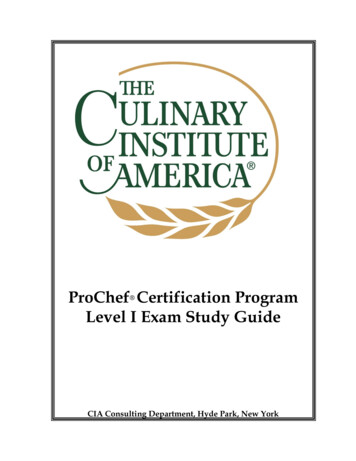
Transcription
ProChef Certification ProgramLevel I Exam Study GuideCIA Consulting Department, Hyde Park, New York
Copyright 2014The Culinary Institute of AmericaAll Rights ReservedThis manual is published and copyrighted by The Culinary Institute of America.Copying, duplicating, selling or otherwise distributing this product is hereby expresslyforbidden except by prior written consent of The Culinary Institute of America.
Welcome, ProChef Certification Candidate!Congratulations on making the decision to validate the skills you’ve gained as a professionalculinarian. You have committed to a rigorous process that offers you the opportunity to not onlyearn a valuable professional certification and promote yourself with a mark of accomplishment,but also help advance our industry.The ProChef Certification exam, and the skills you practice preparing for it, will challenge youto be the very best you can be. During your time in the program, be sure to take note of all theexperience has to offer. You’ll want to recall these memories when sharing your knowledge withcolleagues who will follow in your footsteps to gain their ProChef certification.At any time in the process, please feel free to share your thoughts with me, or any of the examevaluators and staff. We value your insight as we continually strive to offer the best, mosteffective certification program.Thank you for your pride in our profession, commitment to lifelong learning, and spirit of givingback to the industry we all love. We are truly happy you have chosen to embark on this journey,and look forward to your successfully completing the program and representing the ProChefideals as you go forward in your career.Wishing you all the best,Brad Barnes, CMCDirector—CIA Consulting845-451-1613 b barnes @culinary.eduP.S. Did you know that the CIA is an independent, not-for-profit college? As such, your tuitionsupports our core mission of providing the world’s best professional culinary education. If youwould like to further support the future of food with the gift of education, please visitwww.ciagiving.org.PROCHEF CERTIFICATION PROGRAM LEVEL I1THE CULINARY INSTITUTE OF AMERICA
CIA POLICIES AND PROCEDURESEXPECTATIONS FOR PARTICIPANTS Remain in attendance for the exam duration Actively participate Return promptly from breaks No cell phone use or text messaging in the kitchen or during any exam time Follow all established health and safety regulationso In addition to the precautions necessary to guard against food-borne illness,care must also be taken to avoid accidents. The following safety measuresshould be practiced. Wash hands before beginning work in the kitchenKeep all perishable items refrigerated until neededNYS law – when handling “ready-to-eat” food items, if you don’t cook it,glove it!Wash hands, cutting boards, knives, etc. when switching between meatsand vegetables Adhere to appropriate CIA uniform and attire standards as outlined on thefollowing page.PROCHEF CERTIFICATION PROGRAM LEVEL I2THE CULINARY INSTITUTE OF AMERICA
CIA UNIFORM POLICYTo foster a professional working environment and to maintain the highest standards of safetyand sanitation, the CIA has adopted the following uniform code. Each item has been designedwith a practical function in mind. These items must be worn in all production classes unlessotherwise stated. Chef’s jacket Kitchen pants, preferably black or checked Shoeso Should be made of hard leather, with low heels, slip-resistant soles, and no open toes Neckerchief (optional) Toque (provided in class) Apron (provided in class) Side towel (provided in class) Jewelryo Not permitted except for one plain ring to minimize exposure to potential hazards Hairo Should be neatly maintained, clean, and under control at all timeso Long hair should be pinned up and worn under a hair net*Appropriate attire for our business management classes is business or business casual.PROCHEF CERTIFICATION PROGRAM LEVEL I3THE CULINARY INSTITUTE OF AMERICA
NOTICE OF NONDISCRIMINATIONThe Culinary Institute of America (CIA) is an Equal Opportunity Employer committedto the principle of equal opportunity in education and employment, in compliance withTitle IX of the Education Amendments of 1972, Section 504 of the Rehabilitation Act of1973, Title VI and Title VII of the Civil Rights Act of 1964, Age Discrimination Act of1975, and other federal, state, and local laws.The CIA does not discriminate against individuals on the basis of race, color, sex, sexualorientation, gender identity, religion, disability, age, genetic information, marital status,veteran status, ancestry, national or ethnic origin, or any other protected group orclassification under federal or state laws. These principles also apply to admissions,financial aid, academic matters, career services, counseling, housing, employmentpolicies, scholarship programs, medical services, and all other programs and activitiesavailable at the CIA.The Culinary Institute of America, pursuant to Title IX, Title VII, and state laws, alsoprohibits sexual harassment, which includes sexual assault and sexual violence.The HR Director, Faculty Relations is designated as the Title IX Coordinator and AgeDiscrimination Act Coordinator for the CIA. Inquiries to the CIA concerning theapplication of the Age Discrimination Act and Title IX, and their implementingregulations may be referred to the Title IX and Age Discrimination Act Coordinator, orto the Office for Civil Rights (OCR) of the U.S. Department of Education. Additionally,complaints including the procedure for filing a complaint regarding this Notice ofNondiscrimination and the CIA’s compliance with applicable laws, statutes, andregulations as outlined above, may also be directed to:Civil Rights Compliance Officers:Joseph Morano—HR Director, Faculty RelationsTitle IX and Age Discrimination Act CoordinatorThe Culinary Institute of America1946 Campus Drive, Hyde Park, NY 12538Office: Roth Hall, Room S-324Telephone: 845-451-1314E-mail: j morano@culinary.eduMaura King, Director—Compliance504/ADA CoordinatorPROCHEF CERTIFICATION PROGRAM LEVEL I4THE CULINARY INSTITUTE OF AMERICA
The Culinary Institute of America1946 Campus Drive, Hyde Park, NY 12538Office: Roth Hall, Room S-351Telephone: 845-451-1429E-mail: m king@culinary.eduORU.S. Department of EducationOffice for Civil RightsLyndon Baines Johnson Department of Education Building400 Maryland Avenue, SWWashington, DC 20202-1100Telephone: 1-800-421-3481Fax: 202-453-6012; TDD: 1-877-521-2172E-mail: OCR@ed.govThe Harassment, Sexual Misconduct, and Discrimination Policy can be found atwww.ciachef.edu/consumer-information.PROCHEF CERTIFICATION PROGRAM LEVEL I5THE CULINARY INSTITUTE OF AMERICA
POLICY ON STUDENTS WITH SPECIAL NEEDSYour ProChef advisor can provide assistance and offer suggestions regardingaccommodations. If you need a reasonable accommodation, please inform the Directorof Certification and Training, or the Chef Instructor coordinating the program prior tothe start of the exam. Accommodations will not be provided retroactively.Disabled student accommodations are based on individual needs and functionallimitations. It is your responsibility to initiate a request for services and remaininvolved as a concerned student who has taken charge of your own needs. Due toconfidentiality laws governing institutions of higher education, the student mustpersonally disclose a disability and request accommodations from the instructor oradministrator.Please see next page for Disability Services.PROCHEF CERTIFICATION PROGRAM LEVEL I6THE CULINARY INSTITUTE OF AMERICA
DISABILITY SERVICESThe Learning Strategies Center (LSC) is the center for disability services for the CIA.An individual who is registered with the Learning Strategies Center and hasdocumented CIA approved accommodations is encouraged to discuss accommodationsprivately with his/her instructors. Failure to disclose and utilize appropriateaccommodations in a timely manner may affect class performance and grades.Please note: The Learning Strategies Center does not disclose accommodations toinstructors unless directed otherwise by the student.If you are not registered with the Learning Strategies Center and would likeinformation, please speak to the Disability Support Specialist in The Library LearningCommons/Learning Strategies Center at one of the following campuses:Hyde Park: Jodi Amato, Senior Manager, Learning Commons (845) 451-4631,j amato@culinary.eduMary Dietrich, Disability Support Specialist (845) 451-1288,m dietri@culinary.eduSan Antonio: Mar-y-sol Salinas, Learning Specialist (210) 554-6465,m salina@Culinary.eduGreystone:Maria Coggiola (707) 967-2406, m coggio@culinary.eduPROCHEF CERTIFICATION PROGRAM LEVEL I7THE CULINARY INSTITUTE OF AMERICA
POLICY ON ACADEMIC HONESTYAt The Culinary Institute of America, students are expected to develop all of theirown work and ideas. Borrowing original thoughts or recipes without giving credit isplagiarism; copying tests or answers from another candidate is stealing; andpresenting for evaluation during practical examinations, food or drink that wasprepared by someone else for evaluation is cheating. Dishonest behavior, orassisting anyone else with such behavior, represents a serious violation ofprofessional and academic standards at the CIA and will not be tolerated. Suchactions are grounds for disqualification from ProChef Certification.PROCHEF CERTIFICATION PROGRAM LEVEL I8THE CULINARY INSTITUTE OF AMERICA
PROCHEF LEVEL I EXAM:GENERAL INFORMATIONEXAM OVERVIEWThe ProChef Level I Exam evaluates the competency of candidates interested inachieving Pro Chef Level I Certification through The Culinary Institute of America. Thecertification process is divided into two segments; written testing, and practical testing.Additional details pertaining to the written exams can be found in the study guide.To achieve certification, the candidate must successfully demonstrate proficiency in thefollowing areas: Culinary Math Recipe Conversion, Yield, and Ratios Weights and Measures Food Costing Fundamental Nutrition Principles Food Safety and Sanitation Product Identification Mise en Place Classical Knife Skills Stock Production Soup Production Egg Cookery Salad and Salad Dressing Production Cooking Techniques for Proteins, Vegetables, Starches, Grains, and SaucesPROCHEF CERTIFICATION PROGRAM LEVEL I9THE CULINARY INSTITUTE OF AMERICA
PROCHEF LEVEL I CERTIFICATION COMPETENCIESThe ProChef Certification Program divides each certification level into threecompetency categories – culinary, leadership, and financial. The descriptions thatfollow are general skills and knowledge that a candidate must possess in order toachieve ProChef Level I Certification.CULINARY SKILLS Prepare stocks, soups, and sauces Prepare basic cold food preparations such as green salads and salad dressings Apply fundamental culinary techniques such as sauté, braise, roast, fry, and poach Prepare basic vegetable and starch accompaniments such as green vegetables,potatoes, rice, and pasta Demonstrate principles of food safety and sanitation Demonstrate appropriate principles of plate presentationLEADERSHIP SKILLS Demonstrate the ability to listen and follow instructions Demonstrate effective organization of personal work areas for efficient production Demonstrate effective time management during productionFINANCIAL SKILLS Discuss the value of food and labor in a foodservice setting Demonstrate the application of weights and measures in a foodservice setting Calculate a recipe to the desired number of portions Explain yield concept and yield percentage Calculate the cost of a recipePROCHEF CERTIFICATION PROGRAM LEVEL I10THE CULINARY INSTITUTE OF AMERICA
ADVISORSDuring the ProChef Certification program, you will not only have the chance to growand validate your skills, but you will be partnered with one of the CIA's top chefs - yourProChef advisor. Our talented advisors possess extensive, specialized knowledge andyears of industry experience that they will happily share with you.Your advisor will serve as your mentor. He/she will work with you to determine yourstrengths and weaknesses and will be available to answer any questions you may haveas you prepare and study for the examination. You will be provided with that person’sdirect phone extension and e-mail address. After initial contact, it will be yourresponsibility to contact your advisor and seek advice and counsel.The initial discussion with your advisor will focus on reviewing your application,determining the appropriate starting level, assisting you to develop an action plan, andanswering any questions. At the conclusion of this conversation, your advisor mayactually recommend that you postpone registering for the exam at that time. Youcannot register for an exam without first having a conversation with your advisor.ProChef candidates that take full advantage of the advisor process are often highlysuccessful in achieving their certification. Ultimately, it is your choice when to take theexam, but by following the recommendations of your advisor, you can ensure that youare fully prepared for the challenge.PROCHEF CERTIFICATION PROGRAM LEVEL I11THE CULINARY INSTITUTE OF AMERICA
FAQSQ: Are there any prerequisites to take the Level I Exam?A: Before enrolling in the exam, you must first schedule an appointment with youradvisor who will serve as a mentor through the process (refer to page 11 for furtherinformation on advisors).Q: How would you recommend I prepare for the exam?A: In each section of this study guide, you will find a list of competencies, key terms,and sample exam questions to help guide your studies and preparations. In theAppendix at the back of this manual, you will find a list of recommended trainingmaterials that can help you to prepare.Q: How is the exam administered?A: The ProChef Certification exam is divided into two segments, written exams andkitchen practical exams. All written exams will be completed within the 3 testing days.The practical kitchen exams take place over a three-day period, and candidates will beallotted a total of three hours for each practical exam. The total length of the daydepends on the number of candidates enrolled in each session. Each day concludeswith a one-on-one debriefing of the day's results. For your reference, we have includedsample schedules on page 14 and 15). Final class schedules will be administered tocandidates during the program orientation on day one.Q: What are the minimum requirements for certification?A: To achieve ProChef Certification, you must achieve a minimum total weighted scoreof no less than 75% for the entire assessment. The breakdown of the total weightedscore is as follows:65% of the average of the practical examination scores35% of the average of the written examination scoresQ: How many written exams are included in the Level I Certification Exam?A: Written exams are administered throughout the week, and include the following:1) Food Safety and Sanitation2) Culinary Matha. Weights and Measuresb. Recipe Conversion, Yield, and Ratiosc. Food Costing3) Fundamental Nutrition4) Product Identification- the Product Identification exam is not web based and will takeplace on day three of certification.Q: What is the minimum score necessary to pass a written exam?A: You must receive a score of at least 65%.PROCHEF CERTIFICATION PROGRAM LEVEL I12THE CULINARY INSTITUTE OF AMERICA
Q: What happens if I fail three or more written exams?A: If you score below 65% on three or more written exams, you will be ineligible forcertification for the current assessment period. You may, however, reapply to take theentire ProChef Certification Exam the next time it is offered, but not sooner than 3months.Q: How many practical exams are included in the Level I Certification Exam?A: Three practical cooking exams are administered throughout the week.Q: What is the minimum score necessary to pass a practical exam?A: You must receive a score of at least 65% to pass.Q: What happens if I fail a practical cooking exam? Is there an opportunity to retakethe exam?A: If you score lower than 65% on any of the practical cooking examinations, you areineligible for certification for the current assessment period. Unlike the written exams,you may not retake the practical exam. You may, however, reapply to take the ProChefCertification Exam at a future date, but not sooner than 3 months. To gain furtherexperience and enhance your education, we strongly encourage you to stay on andparticipate in all of the practical examinations held during the remainder of the week.Q: If I don’t pass the certification, will I still receive CEUs?A: Yes - you will still receive 4.8 CEUs, providing you remain and participate for theremaining exam. In order to receive CEUs the candidate must stay and finish the week.Q: What items should I bring with me to the exam?A: You must have the following items available: Uniforms: Non-Slip Kitchen Shoes (i.e. Clogs), Chef’s Coat, Chef’s Pants,Pen, Thermometer Knives and hand tools Calculator ProChef Study Guide and other personal reference books Recipes Laptop (optional)PROCHEF CERTIFICATION PROGRAM LEVEL I13THE CULINARY INSTITUTE OF AMERICA
DISTRIBUTION OF WEEKLY MENU ASSIGNMENTSCandidates will receive their menu assignments prior to the start of the kitchen exam.Menu assignments will be randomly distributed. Check with your advisor for moreinformation regarding the distribution of assignments.SAMPLE SCHEDULES FOR WEEKThe exam days are extended and will fluctuate based on the practical testing site.Sample schedule sheets follow. Please note that all times are subject to changedepending on the number of candidates.DAY ONE - SAMPLE SCHEDULEStart TimeTopicFaculty / StaffLocationBecause floor evaluators look for the candidates’ ability to transition between productionand service, times have been separated into two segments. On day 1, each candidate isgiven 2 hours and 45 minutes to produce their assigned 3 course menu, and 15 minutes forservice. All 3 courses must be presented to the tasting evaluators within the servicewindow or the candidate will lose points. Candidates are not allowed to serve early.Below is a sample schedule for one candidate.Prior to cooking, please present your menus to the floor EvaluatorPractical Exam:6:45amChef InstructorProductionService window6:45 – 9:309:30 – 9:45Candidate 19:30 amFirst Service Window Open(15 minutes staggered presentations)Evaluation and scoringGroup FeedbackEvaluation and scoringTesting KitchenChef InstructorLecture HallChef InstructorLecture HallGroup Feedback after the lastcandidate has finished presentingPROCHEF CERTIFICATION PROGRAM LEVEL I14THE CULINARY INSTITUTE OF AMERICA
DAY TWO- SAMPLE SCHEDULEStart TimeTopicFaculty / StaffLocationBecause floor evaluators look for the candidates’ ability to transition between production andservice, times have been separated into two segments. Each candidate is given 3 hours and 15minutes to produce their assigned menu, and egg dishes. Additionally, each candidate will begiven 20 minutes to serve their 3 courses and 2 egg dishes. Fish stock will be evaluated on day 3.All 3 courses and the 2 egg dishes must be presented to the tasting evaluators within the servicewindow or the candidate will lose points. Candidates are not allowed to serve early. Below is asample schedule for 1 candidate.Prior to cooking, please present your menus to the floor EvaluatorPractical Exam:6:45amChef InstructorProductionService window6:45-10:0010:00-10:20Candidate 110:00 amFirst Service Window Open(20 minutes staggered presentations)Evaluation and scoringTesting KitchenChef InstructorLecture HallChef InstructorLecture HallGroup Feedback after the lastcandidate has finished presentingDAY THREE- SAMPLE SCHEDULEStart TimeTopicFaculty / StaffLocationBecause floor evaluators look for the candidates’ ability to transition between production andservice, times have been separated into two segments. Each candidate is given 3 hours and 15minutes to produce their assigned menu and fish stock. Additionally, each candidate will begiven 20 minutes to serve their 3 courses and have their fish stock evaluated. All 3 courses mustbe presented to the tasting evaluators within the service window or the candidate will losepoints. Candidates are not allowed to serve early. Below is a sample schedule for 1 candidate.Prior to cooking, please present your menus to the floor evaluatorPractical Exam:6:45amChef InstructorProductionService window6:45-10:0010:00-10:20Candidate 110:00 amFirst Service Window Open(20 minutes staggered presentations)Evaluation and scoringTesting KitchenChef InstructorLecture HallChef InstructorLecture HallGroup Feedback after the lastcandidate has finished productionPROCHEF CERTIFICATION PROGRAM LEVEL I15THE CULINARY INSTITUTE OF AMERICA
PRACTICAL EXAMINATION OVERVIEWPROCHEF LEVEL I PRACTICAL EXAMINATIONS Day One through Day Three: Culinary Fundamentals, Knife Skills, Egg Cookery,and Stock PreparationTIMINGOn Day One, you will have 15 minutes to set up your workstation, 2 ½ hours for miseen place and production, and a 15-minute window to plate and present all threecourses. Additionally, on Day Two and Day Three, you will be given a total of 15minutes set up time, 3 hours of production and 20 minutes for service. This extra timeon Day Two and Day Three are necessary for the production and service of your eggdishes and fish stock.EVALUATIONThere are two evaluators per exam: one floor evaluator and one tasting evaluator. Thefloor evaluator is responsible for grading your performance in the kitchen; bothevaluators will score your food from a standpoint of tasting.After all food has been evaluated each candidate will receive an individual critique withthe entire class present. As part of the assessment process, each candidate will beexpected to discuss his/her menu as well as provide a self-critique. Following the groupcritique, and after the grades are calculated, you will have the opportunity to reviewyour scores with the evaluators.Evaluation guidelines and score sheets are provided in this study guide for yourreference.PROCHEF CERTIFICATION PROGRAM LEVEL I16THE CULINARY INSTITUTE OF AMERICA
MENUSYou are expected to prepare mise en place sheets and typed menus prior to each exam.You must supply the floor evaluator with (2) typed copies of your menu on Day Onethrough Day Three of the examinations.MAKE-UPSIf you score lower than 65% on any of the practical cooking examinations, you areineligible for certification for the current assessment period. You may, however,reapply to take the ProChef Certification Exam at a future date. To gain furtherexperience and enhance your education, we strongly encourage you to participate in allof the practical examinations held during the remainder of the week.PROCHEF CERTIFICATION PROGRAM LEVEL I17THE CULINARY INSTITUTE OF AMERICA
EGG COOKERY AND FISH STOCK PREPARATION:COMPETENCIES, KEY TERMS ANDPRACTICAL SKILLS GUIDELINESUse the following list of competencies and key terms to prepare for the egg cookery,and stock preparation segment of the practical examinations.COMPETENCIES Successful candidates are able to.Demonstrate methods of egg cookery. Demonstrate stock preparation. Demonstrate proper safety and sanitation procedures. Demonstrate effective organization, workmanship, and presentation.KEY TERMSStockFrench rolled omeletHard-cooked/hard-boiled eggsMise en placeOver-easy eggsPoached eggsSachet d’épicesSoft-cooked/soft-boiled eggsPRACTICAL SKILLS GUIDELINESEGG DISHES Produce 2 French-Style (Rolled) Omelets (3 eggs per portion)Produce, after random selection, ONE of the following egg dishes: 2 Portions of Poached Eggs (2 Eggs per Portion) 2 Portions of Soft-Boiled Eggs (2 Eggs per Portion) 2 Portions of Over-Easy Eggs (2 Eggs per Portion)STOCK Produce 1 Quart of Fish StockPROCHEF CERTIFICATION PROGRAM LEVEL I18THE CULINARY INSTITUTE OF AMERICA
KNIFE SKILLS, EGG COOKERY, AND FISH STOCK:COMPETENCIES, KEY TERMS ANDPRACTICAL SKILLS GUIDELINESKnife skills, egg cookery and fish stock, will be tested within the kitchen practicalexaminations. Candidates will prepare their egg dishes on Day Two of the exam, andfish stock on Day Three. Assigned specific knife cuts must be incorporated into dailymenus. Both the floor and tasting evaluators will be involved in the scoring of the knifecuts.COMPETENCIESSuccessful candidates are able to. Demonstrate knife skills. Demonstrate proper safety and sanitation procedures. Demonstrate effective organization, workmanship, and presentation.KEY TERMSChopConcasséDiceJulienneMise en PlacePROCHEF CERTIFICATION PROGRAM LEVEL IMinceOblique cutTournéSlice19THE CULINARY INSTITUTE OF AMERICA
PRACTICAL SKILLS GUIDELINESKNIFE SKILLS (evaluation is spread out throughout the three days of testing)1) Mince 3 shallot bulbs2) Concassè 3 tomatoes3) Suprême 1 orange or grapefruit4) Finely chop ¼ cup of parsley5) From 3 each 100 ct. russet potatoes, produce: Minimum of 4 tournè2 oz. (60 grams) julienne2 oz. (60 grams) brunoise2 oz. (60 grams) bâtonnet2 oz. (60 grams) small dice6) From 1 lb. (500 grams) horse carrots, produce: Minimum of 4 tournè1 cup oblique-cut7) From 1 large Spanish onion, produce: ½ cup julienne½ cup small dicePROCHEF CERTIFICATION PROGRAM LEVEL I20THE CULINARY INSTITUTE OF AMERICA
EGG COOKERY AND FISH STOCK PREPARATION:EVALUATION GUIDELINES FOR FLOOR SCORE SHEETSFOOD IS SERVABLE (Y/N) This criteria is evaluated strictly on a yes/no basis, either the food is safe/servableor it is not.The Floor or tasting evaluators will determine if any food is un-servable. Fooddeemed un-servable will not be evaluated. The candidate will receive a tastingscore of zero for that food item. Points may still be awarded for the communicationpiece. Un-Servable Food: Food that is unfit for human consumption due to crosscontamination, under-cooking, or other mishandling/abuse that could causeillness.MISE EN PLACE, ORGANIZATION, AND CLEANLINESS (7 PTS) Timely Menu Submission: (1 pt) Candidate submits two neatly typed menus to the Floor Evaluator each daybefore the start of the exam.Timeline/Game Plan Preparation/Utilization: (1 pt) Candidate prepares a timeline/game plan and references it throughout theday’s production. The timeline/game plan should be large enough to be viewed at a distance.Station Organization/Cleanliness: (4 pts) Candidate has out only the food, tools, and equipment necessary for the currentpreparation. The station remains free of clutter. Candidate’s station is free of spills, crumbs, scraps, etc. Candidate’s station is contained to designated area; it does not impede thework of others. Candidate works in an organized, methodical manner transitioning smoothlybetween tasks. Candidate exits the exam leaving his/her station neat and clean. Candidate’s knife kit/ toolbox is clean and sanitary inside.Kitchen Organization/Cleanliness: (1 pt) Candidate contributes to the overall cleanliness and organization of the kitchenincluding the refrigerators, dish area, and the floors.PROCHEF CERTIFICATION PROGRAM LEVEL I21THE CULINARY INSTITUTE OF AMERICA
SAFETY (2 PTS) Candidate moves safely around the kitchen (i.e. alerts other candidates whenhe/she is behind them or is close to them with knives and/or hot items).Candidate safely handles knives.Candidate’s knives are properly sharpened.Candidate safely operates equipment.SANITATION PROCEDURE (1 PT EACH 5 PTS) Candidate Enters Exam Wearing the Proper Uniform: Non-slip kitchen shoes (i.e. Kitchen Clogs), Chef’s Pants, Chef’s Coat, Toque*,Apron*, Side Towel*, Pen, and Thermometer. *(Toque, Apron, and Side Towelare provided by the CIA) Candidate’s uniform is clean and properly maintained. Candidate wears uniform at all times in the kitchen.Appropriate Use of Gloves: Candidate wears gloves when handling food items that are ready to eat,according to CIA policy. Candidate wears gloves when plating food.Avoids Cross-Contamination: Candidate washes hands, cutting boards, knives, etc. when transitioning fromfish to meat to vegetable or dairy preparation. Candidate keeps all finished products away from raw ingredients. Candidate uses a clean tasting spoon every time – no “double-dipping”.Maintaining Proper Food Temperatures: Candidate stores products properly and at the right temperatures according toServSafe standards.Proper Recycling: Candidate uses the proper receptacles for the various types of waste.COOKING TECHNIQUES, SKILLS, AND FUNDAMENTALS (14 PTS) Equipment Usage (2 pts) Candidate chooses appropriate equipment for each task. Candidate uses equipment properly, according to its intended use.Knife Skills (8 pts) Candidate uses the proper knife for each task.PROCHEF CERTIFICATION PROGRAM LEVEL I22THE CULINARY INSTITUTE OF AMERICA
Candidate demonstrates the proper cutting technique for each task.Cooking Technique (4 pts) Candidate uses the proper technique for each task. Candidate properly executes each technique.PROPER UTILIZATION OF INGREDIENTS AND LEFTOVERS(1 PTS EACH 2 PTS) Usable Trim: Candidate saves and properly stores trim that is still usable.Proper Storage: Candidate properly stores all food items. Food should be: Wrapped Labeled Dated Properly ShelvedTIMING OF SERVICE IF LATE ( -1) POINT PER MINUTE UP TO (-10) POINTS Candidate serves all items/courses within allotted 15 minute window (20 minutewindow for egg cookery and fish stock on Days Two and Three). After the window closes, the candidate will have an additional 10 minute graceperiod to serve his/her food. However, during this grace period, the floorevaluator will deduct 1 point per minute up to a maximum of 10 points for lateservice. After this 10 minute grace period your food will not be tasted and youwill be ineligible for certification at this time
The Culinary Institute of America 1946 Campus Drive, Hyde Park, NY 12538 Office: Roth Hall, Room S-351 Telephone: 845-451-1429 E-mail: m_king@culinary.edu OR U.S. Department of Education Office for Civil Rights Lyndon Baines Johnson Department of Education Building 400 Maryland Avenu
